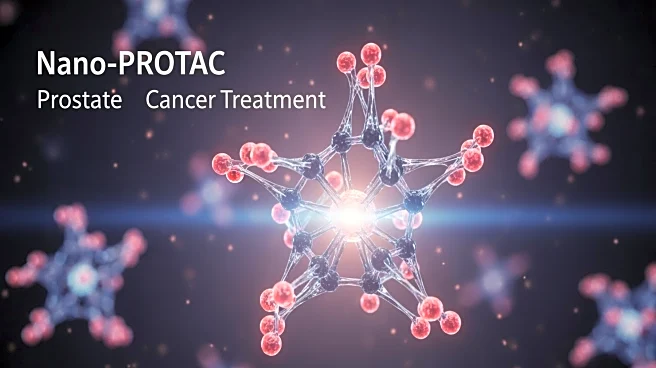What's Happening?
Researchers have developed a novel nano-PROTAC system, named Psa-AR, designed to target and degrade specific proteins associated with castration-resistant prostate cancer (CRPC). This system utilizes a modular
design with four functional domains, including a PSMA-targeting ligand, a self-assembly domain, an AR-binding moiety, and an E3 ligase ligand. The Psa-AR system has demonstrated high specificity and efficacy in degrading AR and HSP90 proteins, which are crucial for the survival and proliferation of prostate cancer cells. In vitro studies have shown that Psa-AR can selectively bind to prostate cancer cells, leading to efficient protein degradation and reduced cell viability. The system's ability to self-assemble and target specific proteins offers a promising approach for overcoming resistance in CRPC treatment.
Why It's Important?
The development of Psa-AR represents a significant advancement in precision medicine for prostate cancer treatment. By specifically targeting and degrading proteins that contribute to cancer cell survival, this nano-PROTAC system could potentially improve therapeutic outcomes for patients with CRPC, a form of prostate cancer that is resistant to conventional therapies. The ability to selectively target cancer cells while minimizing off-target effects is crucial for reducing side effects and improving patient quality of life. Furthermore, the modular design of Psa-AR allows for adaptability and potential application in other types of cancer, making it a versatile tool in the fight against cancer.
What's Next?
Further research and clinical trials are needed to evaluate the safety and efficacy of Psa-AR in human patients. The promising results from in vitro studies suggest that Psa-AR could be a viable option for treating CRPC, but comprehensive clinical testing is necessary to confirm its therapeutic potential. Researchers will likely focus on optimizing the system's design for enhanced targeting and degradation efficiency, as well as exploring its application in other cancer types. The success of Psa-AR could pave the way for the development of similar targeted therapies, revolutionizing cancer treatment and precision medicine.
Beyond the Headlines
The development of Psa-AR highlights the growing importance of precision medicine and targeted therapies in oncology. By focusing on the molecular mechanisms underlying cancer progression, researchers can design treatments that are more effective and less harmful to patients. This approach not only improves patient outcomes but also contributes to a deeper understanding of cancer biology, potentially leading to new discoveries and innovations in the field. The success of Psa-AR could inspire further research into nano-PROTAC systems and their application in other diseases, expanding the scope of precision medicine.









